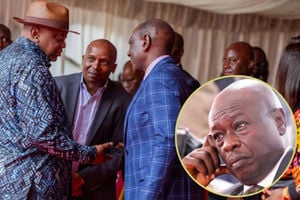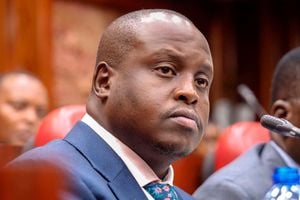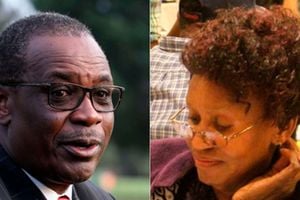
Vials with Covid-19 Vaccine stickers attached, with the logo of US pharmaceutical company Pfizer, on November 17, 2020.
News
Premium
Why the poor may not get Covid-19 vaccine
What you need to know:
- The potential inequalities in vaccine access could delay access to Covid-19 protection in many regions, including Sub-Sahara, until almost the middle of the decade.
Kenya and 156 other countries signed up for Covax, a Covid-19 vaccine allocation plan which is led by WHO Gavi, the Vaccine Alliance and the Coalition for Epidemic Preparedness and Innovations (Cepi).
As researchers race against time to develop a Covid-19 vaccine, wealthy countries with manufacturing capacity are already on a shopping spree for the first available shots.
A global assessment of purchasing agreements for Covid-19 vaccines released on Friday shows high and few middle income and nations have bought nearly 3.4 billion doses, with options for another five billion.
They are dealing directly with manufacturers.
“These direct deals result in a smaller piece of the pie available for equitable allocation. The pattern results in a majority of vaccines going to high income countries,” the survey says.
According to the Duke Global Health Innovation Centre, many of these countries will be able to vaccinate their entire populations and many times over before billions get the drug in the developing world.
The potential inequalities in vaccine access could delay access to Covid-19 protection in many regions, including Sub-Sahara, until almost the middle of the decade.
Covid-19 vaccine
“Countries are hedging bets by making direct deals while also participating in multilateral platforms, which drives inequality and threatens to prolong the pandemic,” said Elina Urli Hodges, who leads the Centre’s Launch, an initiative that identifies impediments to delivering health innovations to poor countries.
“While it will likely take three to four years to make enough vaccines to cover the world’s population, nearly four billion doses of Covid-19 vaccine candidates are already part of bilateral advance purchasing deals involving mainly high-income countries, vaccine developers and global vaccine manufacturers.”
“High-income countries hold a confirmed 3.4 billion doses, upper middle-income countries hold 694 million doses, and lower middle-income countries hold more than 1.7 billion. We have not found evidence of direct deals made by low-income countries, suggesting that they will be entirely reliant on the 20 per cent population coverage from Covax.”
Covax was created to ensure the “equitable access and allocation of Covid-19 health products” between the world’s richest and poorest countries.
Kenya and 156 other countries signed up for Covax, a Covid-19 vaccine allocation plan which is led by WHO Gavi, the Vaccine Alliance and the Coalition for Epidemic Preparedness and Innovations (Cepi).
Said Health Director-General Patrick Amoth: “We joined Covax to ensure we are able to access vaccines that may result from the current trials.”
Covax founding partners
Covax aims to provide two billion doses to protect high-risk populations around the world by the end of 2021.
In the longer term, the goal is to provide funded countries with enough doses to cover 20 per cent of their populations.
Cepi, one of the Covax founding partners, is negotiating with self-financing countries to ensure that, once a certain percentage of their population has been vaccinated, a percentage of the doses secured through bilateral deals would be shared through the Covax countries.
“There are negotiations in which vaccine-rich countries would allocate doses purchased through advance market commitments to the umbrella effort after they have vaccinated a certain portion of their populations,” said Andrea Taylor, who led the analysis for Launch.
However, several middle-income countries, including Kenya also have robust vaccine development programmes and are putting forward vaccine candidates, though these are not as far along in the process as the leading hopefuls from high-income countries.
If any of the candidates from middle-income countries achieve regulatory approval, the landscape will shift significantly.
Already, early stages of the vaccine clinical trials at the Kenya Medical Research Institute Wellcome Trust, Kilifi have kicked off. They involve 40 health care workers.
The trial phase of the vaccine, ChAdOx1 nCoV-19, was developed by the University of Oxford in partnership with the pharmaceutical company AstraZeneca.
It is considered one of the top Covid-19 vaccine candidates worldwide by WHO and the US.
Kemri’s Dr Samuel Sang said researchers are trying to determine if the vaccine is safe.
Safety and impact
“Vaccines which have been found to work and are safe in one population may not work everywhere,” Dr Sang said.
He added that there is need to assess if ChAdOx1 nCoV-19 is safe and works in Kenyan volunteers. The vaccine was being tested for safety and impact.
“Our expectation is to assess whether ChAdOx1 nCoV-19 is safe, effective and elicits a good immune response in people above the age of 18,” he said.
However, it is still in the early stages and might even take more than two years.
In Africa, Covid-19 vaccine trials are being conducted only in Kenya and South Africa.
This means that African countries banking on the vaccines may wait longer.
It means that for the country to protect its people against coronavirus, it will need to allocate funding for the purchase of potential candidates that have shown higher efficacy and for local distribution and implementation capacity to ensure allocated vaccines are utilised.




